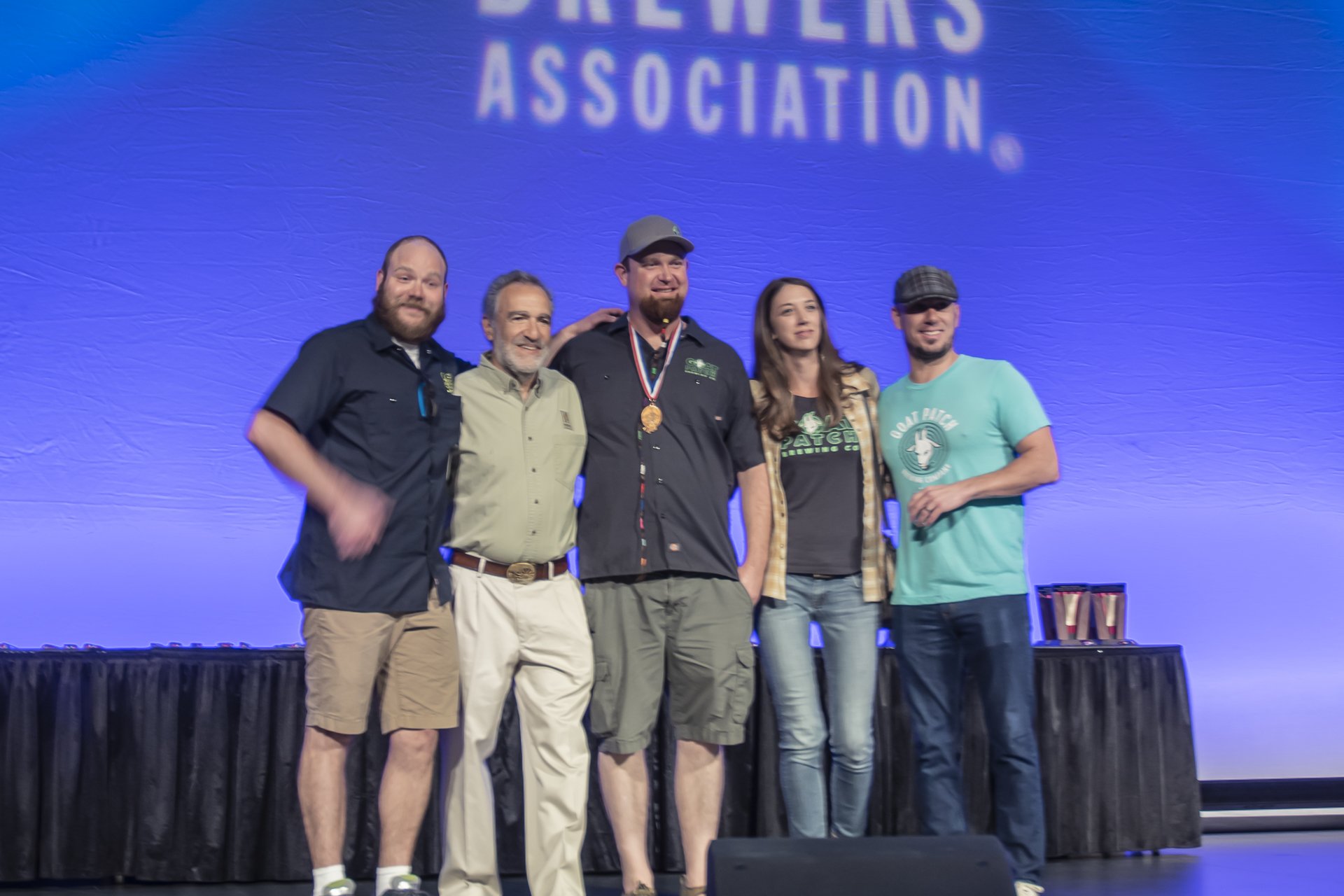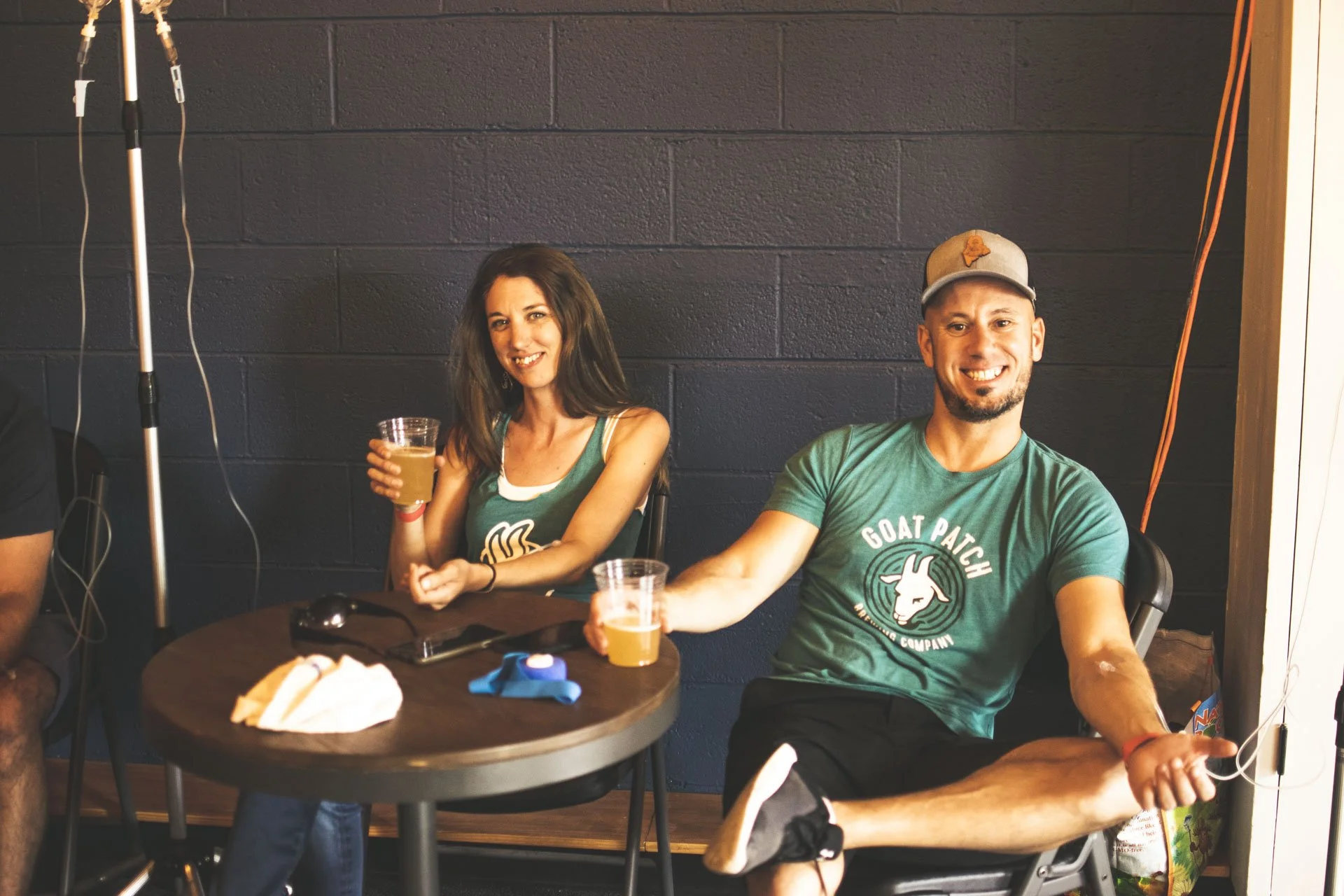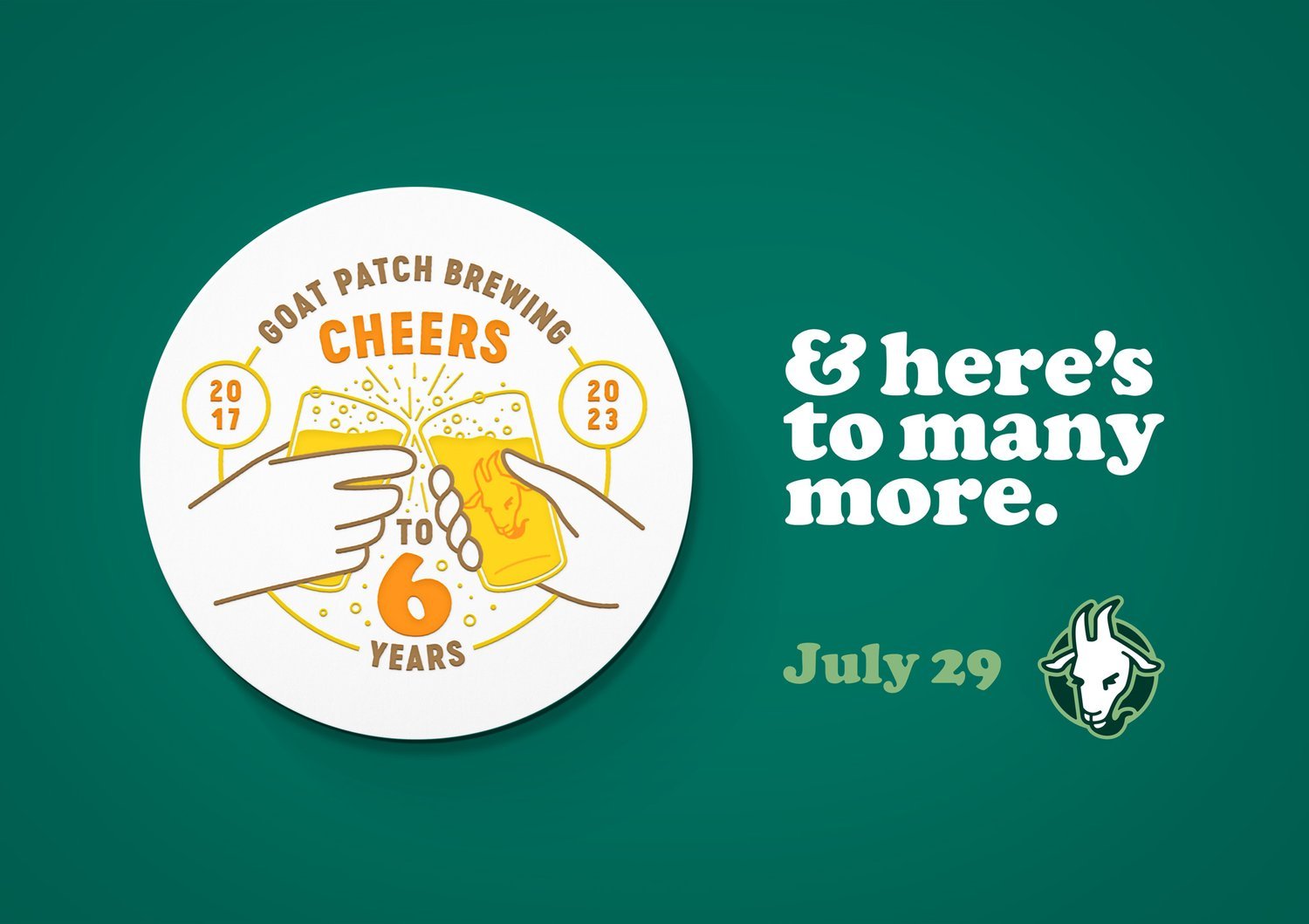Goat Patch is Brewing Balanced Culture
This Saturday, Goat Patch Brewing will celebrate six years in business at the Lincoln Center.
As the cornerstone establishment in the old elementary school, Goat Patch has expanded throughout their end of the building, with two separate bar areas, a private event room and two patios. It was an expansion that came quicker than planned or expected, thrust into action by six-foot social distancing regulations and the ever-fluctuating capacity rules surrounding COVID.
Goat Patch’s Paint Mines Double IPA releases Friday at 5. One dollar from every bottle sold goes to the park.
We sat down with some OG members of the Goat Patch team: Johannah Murphy, Darren Baze and Cate Baze, to discuss their struggles and unexpected successes over the past six years.
As our conversation meandered through an unintentional flagship beers to bottle releases to the support they have received from the community, we gathered a strong sense of culture and dedication to the ‘Patch within their employees and fans.
What is something that you never thought was going to be possible, that you've been able to accomplish?
Darren: I don't know. I just feel like the community really kind of has embraced us way more than I ever thought would. I thought we'd stay smaller, longer. That just seems like, I don't know, we've attracted good people and just really surprised how much support we get from the community. Kind of cheesy answer.
Johannah: Totally, but I think we definitely felt some growing pains along the way. And a lot of the growth that we did see within our space, like here at Lincoln Center, was almost like our hand was forced due to COVID. We rapidly expanded this back area, rapidly expanded the beer garden, all these things that we weren't really planning on doing until we could really do it thoughtfully and with the money behind it.
And then COVID hit, and it was like, how do we get 25% capacity, 50% capacity, spread out these tables at 6ft apart and still maintain our operations and still have enough business to keep the doors open post COVID? And so I feel like it kind of forced our hand to really expand a lot quicker within our space at Lincoln Center. But I think the growth within the wholesale market happened so rapidly that that posed a lot of growing pains and challenges, too, with just not being able to keep up with demand of certain beers, like having our unintended flagship be the bulk of the production and beer going out to the wholesale market.
And so I think with that growth we saw, there were a lot of hardships that came along with it. The rapidness of the growth over those couple of years was a big challenge for us.
Darren: We planned to grow and we built a place to be able to grow, but it just happened faster than we expected.
So when you say unintended flagship, which one's the unintended flagship?
Darren: The hazy IPA. That was the first beer I brewed—it was just to test the equipment. I made it and we sold it all, and then everybody got real mad.
Cate: When it was gone. That was our first crisis.
Darren: Now, we're brewing a batch every week and some weeks, two batches, we're pumping out like 150 barrels a month.
When Goat Patch launched, you established a motto of “Home of Balanced Brews.” How true to that motto do you feel like you’ve stayed?
Darren: I think we've done pretty well. We try to make each of our individual beers balanced, but also balance the variety of styles. I think we've done pretty well at both for the most part and every once in a while we throw caution to the wind and go for it.
That said, we don't really brew test batches. If we brew it, we brew a double batch. And sometimes the first try will be a little extreme, like with the Habanero, that one was good, but it was hot.
Even the seltzer I think is more balanced than what you get from a can at a gas station. It's a mango seltzer and it's not “punch-you-in-the-face” mango. It's there. It's nice and refreshing, but that's kind of what we try to do with all our beers.
Cate: I'm from Chicago, so my dad's the true Cubs fan: a Bud guy, through and through. We're like, oh, this is actually a place he would come drink. Because he's not a beer nerd. He's a Bud Light guy. And so that was something I think we held true, with the wide range of beers on tap.
What's the next step for Goat Patch? Will Lincoln Center just become entirely Goat Patch at some point?
Johannah: Probably not. The other businesses within Lincoln Center really just add to the community vibe that we have here. We love having all these other kinds of businesses right around the corner, or even right next door.
Cate: We just have the best neighbors. Between Nightingale, Building Three, and The Roswell next to us for food, there's just so many options, people just really enjoy stopping here. We're thankful that we ended up here. As much as it's hard not to own a building, it's offset by being surrounded by really cool people.
What are you most excited about when you come into the Brewery? What drives you to be your best here?
Johannah: The team, for me, which has been 100% amazing from day one. I think that we have a plethora of really strong people that have been in the industry for a while, so I think coming into this project with the knowledge and experience, that's what was exciting for me. I joined this team for that reason in the early days and it's what still drives me to this day—knowing that I have solid support teams from the ownership side and feel respected and appreciated. And then the team that we have on the front of the house and the back of the house—I feel like we've got some of the best brewers putting out some of the most consistent products that I've seen from a smaller regional brewery, especially one that's just turning six years old. But I would say the community that we've built and the team that we've built here keep me going.
Cate: I was going to say something similar, but I get most excited about what's happening with our team, too. Like with wholesale growing the way it is and seeing someone like Dayne our Sales Manager, who started as a beertender and has grown into her current position. Just seeing people build their career here has been so inspiring—seeing people really find a home here at Goat Patch. Six years ago, I certainly didn't think that this is what the brewery would look like at year six.
And with our team, we have young people that have their whole lives ahead of them. They could go a lot of different places. So it starts to feel more like they're choosing to be here and that feels good that they want to stay here.
Johannah: We’ve had people ask: “are you guys like building some kind of cult here?” And only because people don't leave. I had to respond that it’s not a cult, it’s our culture.
How have you seen your customers’ tastes and favorites change over the years?
Darren: It’s been a massive shift from maltier beers that used to be king, like Laughing Lab, Fat Tire, you name it. Everyone had to have an amber or brown ale, but now you need to have a good Hazy IPA to be relevant, I think.
Johannah: Also, we are releasing a seltzer for the first time.
Darren: We are releasing a seltzer…a Mango Seltzer. It’s our first attempt, so hopefully it goes over well.
Johannah: Yeah. I think the changing landscape is something that we kind of had on our radar from the day one. I think craft beer even six years ago wasn't what it was ten or twelve years ago here in Colorado, let alone Colorado Springs. Seeing the landscape shift over the last decade plus was something that we've tried to keep our finger on the pulse of and continue to innovate.
One thing that has helped a lot of us is the loosening of the laws in regards to brew pubs to make the license a lot more enticing for people. One thing we knew coming out of the gate is we really didn't want to have a kitchen and deal with food, but you see a lot of breweries relicensing into a brew pub model to be able to accommodate wine drinkers, spirit drinkers and alternative beverages like that.
I think just trying to stay relevant—providing options for people that might be gluten free, might be not beer drinkers, but are out on a bike ride with five beer drinkers, is what we’re going to strive for.
Goat Patch’s offerings on day one.
Goat Patch’s menu board has a ton of different styles, but which one (style or specific beer) do you find you gravitate towards when you’re here drinking?
Johannah: Helles, definitely.
Cate: Right now, the Tart Cranberry when it’s on tap.
Darren: Helles. It’s kind of what we love to make as brewers…we love to brew lagers.
To date, Goat Patch has bottled a lot of special beers, but hasn’t done much else in terms of canning. Is canning in the future?
Darren: At some point, keg sales will probably peak, but I don’t think we’ll reach that point at this facility with our capacity here. I don’t think we can brew enough to need to can, or if we’d be even able to do that.
Johannah: Canning is such a volume play to get your beer out into the market, and we’re already facing challenges keeping up with demands with keg sales and in our taproom. We’d have to ask ourselves if it was worth taking on another challenge.
Cate: The hardest part about canning is that we know our patrons want it, so it’s hard to keep saying no to something people want. From that perspective, it’s like the topic never dies for our team, but it’s not a reality right now. It may happen at some point, but there are other priorities at the moment.
Which part of the anniversary party are you the most excited for?
Cate: I think it’s always just such a feel-good time.
Johannah: Yeah, I think I'm most excited just about the support from the community that comes out for that day. All of our regulars, our community, make the celebration all the better. Yeah, we can put some extra food trucks on the agenda, throw some extra live bands out there, but it’s the people that show up and their excitement about our birthday that makes it all the more fun.
Cate: Also, our It Takes A Tribe ceremony, where we present the nonprofit groups their check and announce next year’s groups.
Our blurry photo of the Goat Patch team on stage at GABF in 2018. We weren’t entirely ready haha.
Tell us a little more about the It Takes a Tribe program…
Cate: That was another one of those things that we decided early on. We all have our different areas of specialty and things that we're passionate about, so before we even opened, we knew that we wanted to not just do your typical give back night where it's like, oh, come in and a dollar goes to X Charity.
We wanted something to be year-round, something that was truly like “the community beer.” Initially, we kind of jumped around trying to decide which beer would that be? We landed on the Red because it was one of the first ones that Darren brewed on the little basement pilot system.
Darren: We thought it would be the best, and it’s proven to be more than that. It’s won medals at GABF and the World Beer Cup, and it’s raised a lot of money for local charities.
Cate: We thought it would sell the most, and we wanted to be able to give the most. It was kind of on the docket even before we opened. Anybody, any day, anytime, can come in, get a Red and give back. We thought it would be more impactful if customers could participate and decide where the money goes.
We all grew up in community-oriented families and so it just felt really natural.
Johannah: I think it also lends to the community support and the relationships that we've built over those years, and the excitement it’s built in the nonprofit community.
How do you choose the selected nonprofits each year?
Cate: For Bleating Heart nights, we just get a flood of applicants and because we have so many weeks, we're generally able to plug almost everybody in.
For the annual ones, we put it out to our leadership team. We see what they're doing, what they're impacting. We typically always have a military one just because of Justin's background as a Ranger and just being in a military community. And the other ones, they've totally ranged from random things to other random things we’re interested in. None of them are correlated, but it's typically just kind of what people vote for and then we put them in for a year. It's been a fun way to connect with different people from our community we may not ever get the chance to interact with.
For the Anniversary party, are any of the beers extra-limited, or are there any people shouldn’t miss?
Johannah: Everything we’re releasing on Saturday is very limited, save for the Friday night release.
Cate: One thing we are doing different this year is the beer releases all come out at noon instead of staggered throughout the day. We want everyone to be able to try them if they show up.
Darren: Don’t sleep on the Guava Blonde. It’s the beer we brew special for The Well downtown, so our anniversary and their bar are the only two places you can get it.










